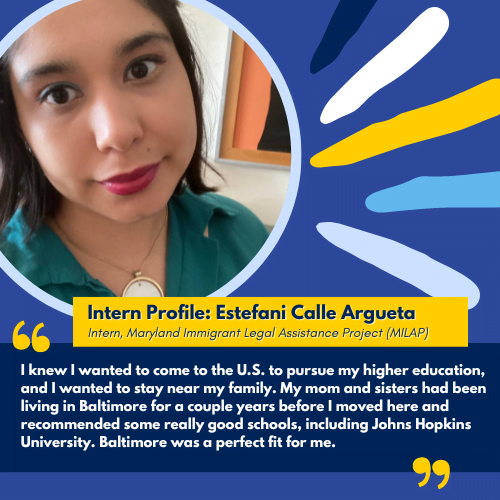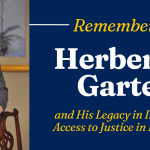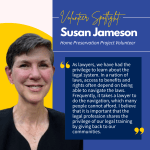Intern Profile: Estefani Calle Argueta

Where did you grow up?
I grew up in Guayaquil, one of the biggest cities in Ecuador, and graduated from high school there. I lived there for 15 years, until I came to the U.S. in 2016.
What brought you to Maryland/Baltimore?
I knew I wanted to come to the U.S. to pursue my higher education, and I wanted to stay near my family. My mom and sisters had been living in Baltimore for a couple years before I moved here and recommended some really good schools, including Johns Hopkins University. Baltimore was a perfect fit for me.
Where do you go to school and what was your major/focus?
I am a rising senior at Johns Hopkins University majoring in Political Science and Spanish with a minor in Psychology.
What do you do at PBRC?
I am a legal interpreter at PBRC working as a liaison between lawyers and their clients. I am involved in several projects and tasks, from interpreting conversations, translating legal documents from Spanish to English, helping with asylum applications, and calling clients to schedule appointments and register them for clinics. I also go to court in-person to meet with clients who need representation.
What do you find interesting about this work?
What I find interesting about this work is how much I am able to learn about the legal system and immigration each day. I have always wanted to be a lawyer and I plan to go to law school after college, so this work has been a great experience to work in a legal setting and understand what it is like to be a lawyer.
What, if anything, did you find surprising about remote meetings with clients? What has been rewarding? What, if anything, has been frustrating?
I was surprised how effective remote meetings with clients were. We were able to serve them just as well or better through remote meetings as we were through in-person meetings. It was rewarding to give clients private and efficient consultations. Many clients live far away and not having to pay for transportation was very helpful for them. Even though remote meetings have allowed us to reach clients we otherwise would not have reached, it has been frustrating to not be able to serve each client who approaches us due to the high demand.
Tell me about a client you have met while working with PBRC, or a pivotal experience you’ve had volunteering with the projects.
A client I have met while working with PBRC was the first client I worked with for an asylum application. Our client did not have the resources to hire a lawyer and so it was very fulfilling to be able to help them. It was a frustrating case at first since it was difficult to piece together the details of what our client had gone through, including when and where events took place, but we were able to create a strong application for them after two weeks of intensive work. It was a huge relief after we finished, knowing we had done everything in our power to help our client.
Is there a particular moment or memory that stands out for you?
A particular memory that stands out to me is how I was able to truly connect with clients, especially by resolving the language barrier between them and the lawyers. Once clients felt comfortable with me, they would provide me with more detailed, personal information that would help us strengthen their cases. Seeing how grateful our clients were for our help and the impact we were able to make on their lives was such a rewarding experience.
What is your proudest accomplishment? [Professional? Non-professional?]
My proudest accomplishment is how much my interpreting skills have improved. I’m now able to listen to a person talking in Spanish and immediately write down what they say in English, something I could not do previously. I have become significantly more confident in my Spanish and English abilities, and I have grown so much as a person and interpreter during my time at PBRC.
What motivates you, OR who is a hero, OR what is a quote that inspires you to do the work you do?
What motivates me is the lack of lawyers and interpreters who can speak Spanish. My goal is to bridge the gap between the underserved immigrant population by eliminating language barriers. I came to the U.S. not knowing how to speak English, so I know how difficult and frustrating it can be to not be able to communicate with others. Now that I know both English and Spanish, I am better equipped to give back to my community.
What message would you give to people thinking about volunteering with PBRC?
Volunteering with PBRC is a tough but highly rewarding experience. You will learn so much about the legal system, including immigration, asylum, and what it’s like to work in a legal setting as a lawyer, interpreter, and in various other legal positions. You should also be mindful of how you communicate with your clients. If you can make them comfortable and show them that they can trust you, they are much more likely to share information with you, which helps you serve them more effectively.
For more information about volunteering in Maryland, please contact: education@probonomd.org






